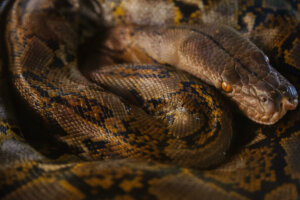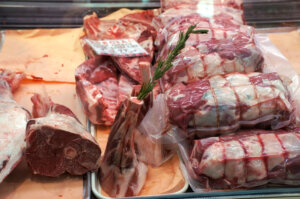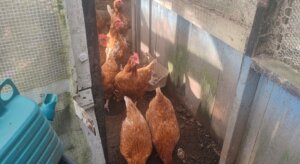The impact of climate change on food security: Is python next on the menu?
Written by Jennifer Igbafen on 19th April 2024
With climate change still on the rise, scientists are looking for solutions to satisfy food security; the latest being python meat. Jennifer Igbafen gets the thoughts of the public on the possibility of python farming spreading to the UK.
Due to effects of climate change increasing climatic volatility, global food security is at risk and alternative solutions are coming to the forefront. Snake farming, particularly python, has already become the norm in Asia, but will it become a global trend?

Credit – Alamy
According to scientific reports, research shows that pythons are more sustainable than conventional livestock because they can grow quickly, regulate their metabolic processes and maintain their body conditions in volatile environments even when fasting, and ultimately serve as a better source of protein.
Scientific reports found that 12% of the global human population is undernourished and that acute protein deficiency is impacting the workforce in low-income countries. “Ectotherms (cold-blooded animals) are approximately 90% more energy efficient than endotherms”, and so have a higher production efficiency.
Charlotte Mitchell, 36 has been the owner of the traditional butcher’s shop Charlotte’s Butchery in Newcastle for 11 years. Her passion for “farming, keeping things local, and food sustainability” is the reason why her butchery sells sustainable meat, including: sausages, haggis, black pudding, game, beef, pork, lamb and poultry, which they get “from the two abattoirs in County Durham and our poultry comes from a small farm in West Cumbria”.

Credit – Alamy
She believes sustainable agriculture is a significant practice to mitigate the environment. Charlotte said: “It’s really important that we start to give back to local food producers.
“Climate change is becoming an increasing problem with wet weather and fluctuating temperatures really having an impact on land and livestock.”
“Python meat means that the animal itself requires very little, in terms of feed and water,” Charlotte said.
“I think more people will find this more appealing than an insect diet. I’d like to think we can continue to eat the more traditional meats.
“Farmers are having to find innovative ways of making money with the livestock being more of a sideline, which is a massive shame.
“However, food is food and python meat is a source of protein – so it may have to come to that.”
Eddie Critchlow, 77, has owned an allotment for 17 years, which he started when he retired and uses it to grow vegetables and keep chicken coops. He said: “I’ve got 170 chickens now and the money I get off the eggs pays for the feed.
“I use seven 20 kilo bags a week to feed them – they’re called layers pellets. And I give them wheat which I buy from a farm, which is £5 a bag, but you only get that once a year.”

Credit – Jennifer Igbafen
Because certain conditions are required for the chickens, it’s hard to maintain his normal routine throughout the year. He said: “Well, in the winter, from November to the beginning of January/February, the chickens don’t lay because it’s too dark for them.
“And when the sun comes out it’s better for the hens, you get more eggs then.”
Moorhouse Farm Shop owner Ian Byatt thinks that python farming “might be a step too far in Northumberland”. He said: “Might be ok in tropical climate areas, but I assume will require significant heat input in colder areas.
“Also issues with acceptability and cultural likes/dislikes, and can only ever see it as a niche market product in most of Europe.
“Can see how it may be useful if it’s used a simply a ‘disguised’ protein source in processed food though.”
Queen’s University Belfast Professor of food safety Christ Elliott said: “There are many different initiatives going on in many parts of the world to look for alternate sources of meat which are more environmentally sustainable than current livestock systems.”
So, to really understand the value of python meat, a “lifecycle assessment” (LCA) – “a systematic analysis of the potential environmental impacts of products during their entire life cycle” must be conducted. He said: “Often when the LCAs are conducted properly the environmental credentials of a novel protein diminish.”
There are still many questions that must be asked surrounding the nutritional value of python meat and its financial viability. Chris said: “How much will it cost to produce a Kg of meat and how much is the market willing to pay for it?”
Additionally, global discourse around consumer acceptability may inhibit the spread of python farming. “While in some parts of the world eating snake is perfectly acceptable in others it won’t be accepted by large parts of the population,” Chris said.
The report concluded that python farming can “complement existing livestock systems”, and also offer better production in return.
Eddie said: “I don’t think there would be many python farms in England.”
Sharing the same sentiments, Charlotte said: “I can’t imagine in the foreseeable, it would have a huge effect.
“I do think that it is useful to have a plan if farmed animals start to deteriorate and farm closure becomes more rife.”





